Dustin Hoffman (1937) is an Oscar-winning American actor with a career in film, television, and theatre since 1960. Short in stature and not typically handsome, Hoffman is known for his versatile portrayals of antiheroes and vulnerable or emotionally explosive characters. He has earned acclaim for his work in such films as The Graduate (1967), Kramer vs. Kramer (1979) and Rain Man (1988). Hoffman made his directorial debut with Quartet (2012).
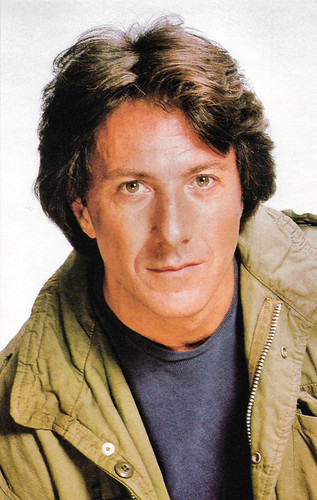
American postcard by Coral-Lee, Rancho Cordova, no. CL/Personality # 112. Photo: Greg Gorman. Dustin Hoffman in Tootsie (Sydney Pollack, 1982).
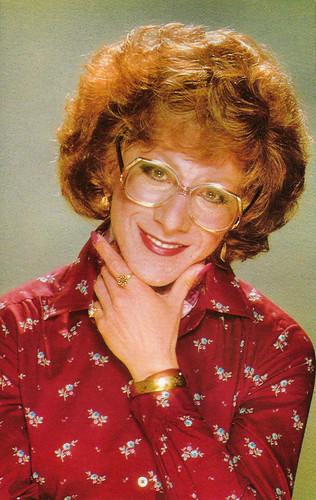
American postcard by Coral-Lee, Rancho Cordova, no. CL/Personality # 113. Photo: Greg Gorman. Publicity still for Tootsie (Sydney Pollack, 1982).
Dustin Lee Hoffman was born in Los Angeles, California, in 1937. His parents were Lillian and Harry Hoffman. His father was a furniture salesman and prop supervisor for Columbia Pictures. Although he is Jewish, Hoffman and his brother were raised in a relatively secular household. Hoffman graduated from Los Angeles High School in 1955.
Hoffman's acting career began at age 19 when he dropped out of music studies at California’s Santa Monica City College to pursue the stage at the Pasadena Playhouse. There, Hoffman befriended another young actor, Gene Hackman. Eventually, the two would move to New York City where they lived together with Robert Duvall, all three looking for work in television and off-Broadway plays. Hoffman studied at Actors Studio and became a dedicated Method actor. He took odd jobs and the occasional bit role to make ends meet. Frustrated by his lack of greater success, Hoffman once left acting to teach, but in 1960 he won a role in the off-Broadway production 'Yes Is for a Very Young Man'. After 'A Cook for Mr. General' (1961), however, he continued to struggle and did not reappear onstage for several years, in the meantime studying with Lee Strasberg at the Actors' Studio and becoming a dedicated Method actor.
Slowly but surely, Hoffman began building a strong reputation through smaller roles in productions of 'Waiting for Godot' (1964) and 'The Dumb Waiter' (1964) by Harold Pinter. He won a Best Actor Obie for his work in 'The Journey of the Fifth Horse' (1966), a Theatre World Award and a Drama Desk Award for 'Eh?' (1966). Word of mouth soon reached Hollywood, and Hoffman made his film debut with a tiny role in The Tiger Makes Out (Arthur Hiller, 1967), alongside Eli Wallach. A leading role in the Italian-Spanish comedy Un Dollaro per Sette Vigliachi/Madigan's Millions (Giorgio Gentili, 1968) with Elsa Martinelli, followed later that same year. He played a witless government agent sent to Italy to find the million dollars that a murdered gangster (Cesar Romero) kept hidden.
In 1966, director Mike Nichols auditioned Hoffman for a lead role in the Broadway musical 'The Apple Tree' but rejected him because he could not sing well enough and gave Alan Alda the part. But Nichols was so impressed with Hoffman's overall audition he cast him as Benjamin Braddock, who returns to his wealthy parents' home in California after graduating from college, in The Graduate (Mike Nichols, 1967). Hoffman was 30 years old when he played the 21-year-old Benjamin who, in a search for a meaningful future, aimlessly drifts into an affair with a married woman (Anne Bancroft) who is the age of his parents. The successful social comedy struck a nerve with young audiences disenchanted with the American establishment, and Hoffman was launched as a star.
In 1969, Hoffman struck gold again with the gritty Midnight Cowboy (John Schlesinger, 1969), in which he played the part of Ratso Rizzo, a homeless man in New York City, who develops a friendship with an unsuccessful male prostitute (Jon Voight). Grim and downbeat in its depiction of a heartless New York City, the film was another unlikely success for Hoffman. It garnered him a second Oscar nomination. Also in 1969, Hoffman co-starred with Mia Farrow in John and Mary (Peter Yates, 1969). He was nominated for a Golden Globe Award and received a 1970 BAFTA Award for his role, although the film itself received mixed reviews. In 1970, he starred in Arthur Penn's Little Big Man, delivering a superb portrayal of an Indian fighter - a role which required him to age 100 years.

Vintage postcard. American poster by United Artists of The Graduate (Mike Nichols, 1967) with Dustin Hoffman and Anne Bancroft.
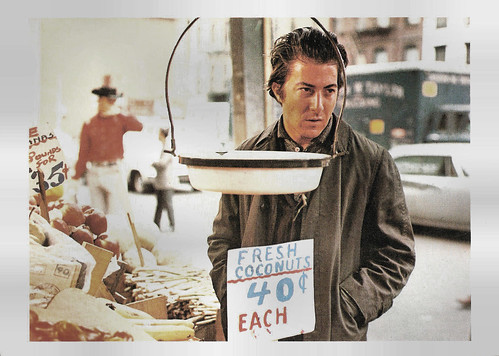
French postcard by Editions La Malibran, Paris, no. MC 9. Photo: publicity still for Midnight Cowboy (John Schlesinger, 1969).
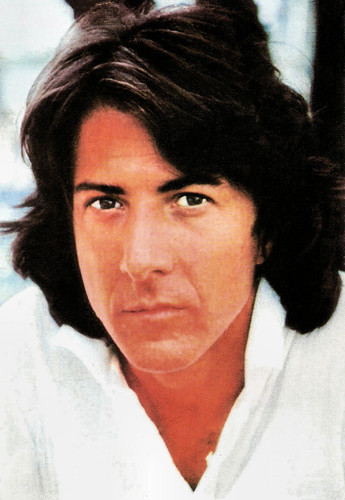
Spanish-Canadian postcard by Bergas / Photos Vedettes, Charlesbourg, 1977.
On a roll in the 1970s, Dustin Hoffman starred in several acclaimed films, including Straw Dogs (Sam Peckinpah, 1971) in which he played a cowardly mathematician who violently defends his home, the box office hit Papillon (Franklin J. Schaffner, 1973) as a prisoner opposite Steve McQueen, and Lenny (Bob Fosse, 1974) as the legendary, self-destructive stand-up comedian Lenny Bruce. This stunning portrayal earned him a third Academy Award nomination.
Another highlight was the political thriller All the President's Men (Alan J. Pakula, 1976) about the Watergate scandal, which starred Hoffman and Robert Redford as the real-life journalists, Carl Bernstein and Bob Woodward. Hoffman next starred in the thriller Marathon Man (John Schlesinger, 1976), based on William Goldman's novel of the same name, opposite Laurence Olivier and Roy Scheider.
He finally won an Academy Award for his performance as a sympathetic father in Kramer vs. Kramer (Robert Benton, 1979), with co-star Meryl Streep also nabbing an Oscar. The film tells the story of a married couple's divorce and its impact on everyone involved, including the couple's young son. In 1982, playing yet another antihero, Hoffman starred in the comedy Tootsie (Sydney Pollack, 1982) as Michael Dorsey, a down-and-out actor who must dress up as a woman to find steady employment on a daytime soap opera. Tootsie earned ten Academy Award nominations, including Hoffman's fifth nomination. The film grossed nearly $100 million during its theatrical release.
His two returns to the stage during the 1980s proved great triumphs for Hoffman. First was his much-lauded performance as Willy Loman in the Broadway revival of Arthur Miller’s Death of a Salesman (1984), which was adapted for television the following year and earned Hoffman an Emmy Award and a Golden Globe Award. Always determined to select a challenging variety of roles, he next appeared on stage in London as Shylock in Sir Peter Hall’s production of The Merchant of Venice (1989).
Then, Hoffman starred in the Hollywood smash Rain Man (Barry Levinson, 1988) alongside Tom Cruise. Hoffman's portrayal of a middle-aged autistic savant earned him a second Academy Award and remains one of his most iconic performances. Encyclopaedia Britannica: "Not unlike Hoffman’s earlier roles, Rain Man’s Raymond Babbitt is a difficult character to embrace because of his emotionless nature, but the actor elicits just the right amount of sympathy from an audience."
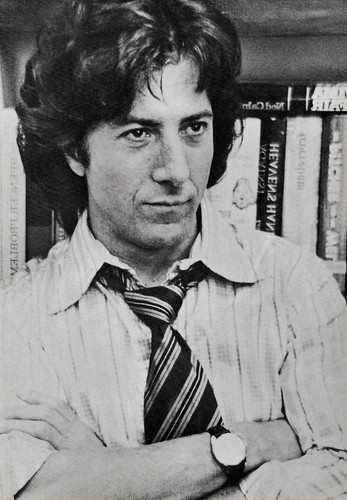
French postcard by Euro-Images, St. Jean de Vedas, no. CP 73. Photo: publicity still for All the President's Men (Alan J. Pakula, 1976).
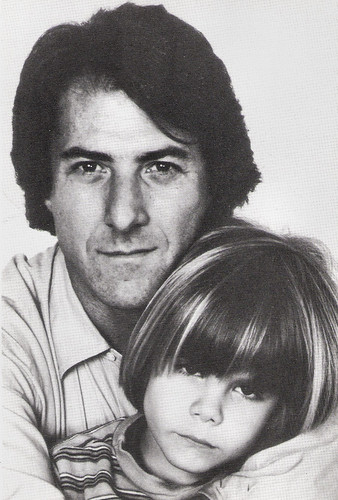
Belgian postcard by Joepie / Raider Bounty. Photo: publicity still for Kramer vs. Kramer (Robert Benton, 1979) with Justin Henry.
The 1990s brought Dustin Hoffman appearances in a series of big-budget films that proved largely disappointing at the box office. He made a comeback in the revenge drama/legal thriller Sleepers (Barry Levinson, 1996) with Robert De Niro, Brad Pitt, Jason Patric, and Kevin Bacon. Hoffman's next critically acclaimed role was in the biting political satire Wag the Dog (Barry Levinson, 1997). He played Stanley Motss, a neurotic, fame-hungry Hollywood producer who coconspires to fool the entire world into believing that the United States is at war with Albania, and scored his seventh Oscar nomination.
In 2004, Hoffman again exhibited his comedic prowess when he starred with Lily Tomlin in an offbeat movie about a husband-and-wife detective team that helps clients solve their existential problems, I Heart Huckabees (David O'Russell, 2004). Further cementing his new direction, he went on to appear as Ben Stiller's father in the broad comedies Meet the Fockers (Jay Roach, 2004) and Little Fockers (Paul Weitz, 2010). He also played a 243-year-old owner of a strangely enchanted toy store in the children's fantasy Mr. Magorium's Wonder Emporium (Zach Helm, 2007).
Hoffman continued to star in blockbuster films like Stranger than Fiction (Marc Forster, 2006) with Will Ferrell, but also lent his voice to the computer-animated films Kung Fu Panda (Mark Osborne, John Stevenson, 2008) and The Tale of Despereaux (Sam Fell, Robert Stevenhagen, 2008). In 2012, at the age of 75, Hoffman made his debut as a film director with Quartet (Dustin Hoffman, 2012), an ensemble comedy about former opera singers residing in an English retirement home, with Maggie Smith and Michael Gambon. In 2014 he joined the ensemble cast of Jon Favreau's critically acclaimed Chef (Jon Favreau, 2014). Two years later, he won the International Emmy Award for Best Actor for his work on Roald Dahl's Esio Trot (Dearbhla Walsh, 2015), based on a children’s book about a bachelor romancing his tortoise-loving neighbour (Judi Dench). In 2017 he starred opposite Adam Sandler in The Meyerowitz Stories (New and Selected) (Noah Baumbach, 2017), playing a sculptor preparing for a retrospective of his work in New York.
In the fall of 2017, after the Harvey Weinstein sexual harassment allegations rocked Hollywood, Hoffman became one of the actors forced to account for past behaviour. Writer Anna Graham Hunter, who was 17 when she interned on the set of the TV Movie Death of a Salesman (Volker Schlöndorff, 1985), recounted the older actor asking about her sex life and groping her. In December, a new round of reports surfaced in which five women accused Hoffman of sexual assault or harassment, including accounts of the actor exposing himself and forced sexual activity. Hoffman denied.
Apart from his successful professional work, Hoffman married Anne Byrne in 1969. He adopted her daughter, Karina, from a previous marriage, and in 1970 their second daughter, Jenna, was born. After more than 10 years of marriage, Hoffman and Anne divorced in 1980. Soon after, he married attorney Lisa Gottsegen. They would go on to have four children: Jacob Edward, Rebecca Lillian, Maxwell Geoffrey and Alexandra Lydia.
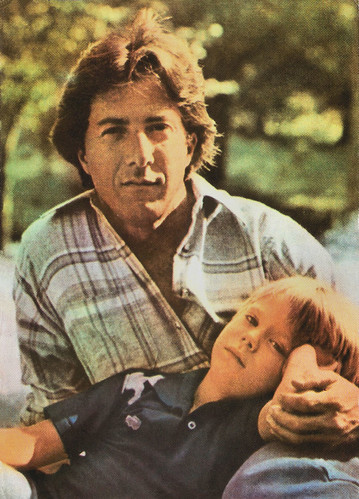
Romanian postcard by Casa Filmului Acin. Photo: publicity still for Kramer vs. Kramer (Robert Benton, 1979), with Justin Henry.
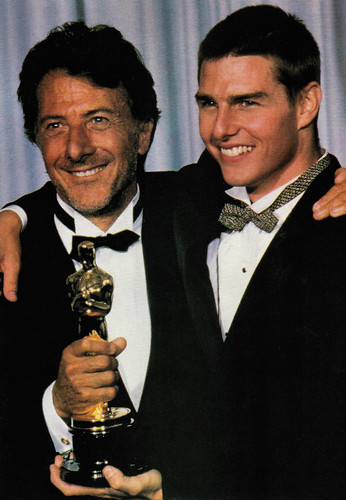
French postcard, no. SL. 4037. The Academy Awards Ceremony 1989: Dustin Hoffman wins the Best Actor Oscar for Rain Man (Barry Levinson, 1988), with co-star Tom Cruise.
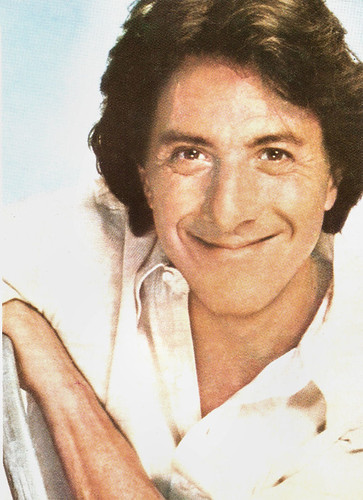
Romanian postcard by Casa Filmului Acin.
Sources: Jason Ankeny (AllMovie - page now defunct), Encyclopaedia Britannica, Biography.com (page now defunct), Wikipedia and IMDb.
This post was last updated on 10 October 2024.

American postcard by Coral-Lee, Rancho Cordova, no. CL/Personality # 112. Photo: Greg Gorman. Dustin Hoffman in Tootsie (Sydney Pollack, 1982).

American postcard by Coral-Lee, Rancho Cordova, no. CL/Personality # 113. Photo: Greg Gorman. Publicity still for Tootsie (Sydney Pollack, 1982).
A dedicated method actor
Dustin Lee Hoffman was born in Los Angeles, California, in 1937. His parents were Lillian and Harry Hoffman. His father was a furniture salesman and prop supervisor for Columbia Pictures. Although he is Jewish, Hoffman and his brother were raised in a relatively secular household. Hoffman graduated from Los Angeles High School in 1955.
Hoffman's acting career began at age 19 when he dropped out of music studies at California’s Santa Monica City College to pursue the stage at the Pasadena Playhouse. There, Hoffman befriended another young actor, Gene Hackman. Eventually, the two would move to New York City where they lived together with Robert Duvall, all three looking for work in television and off-Broadway plays. Hoffman studied at Actors Studio and became a dedicated Method actor. He took odd jobs and the occasional bit role to make ends meet. Frustrated by his lack of greater success, Hoffman once left acting to teach, but in 1960 he won a role in the off-Broadway production 'Yes Is for a Very Young Man'. After 'A Cook for Mr. General' (1961), however, he continued to struggle and did not reappear onstage for several years, in the meantime studying with Lee Strasberg at the Actors' Studio and becoming a dedicated Method actor.
Slowly but surely, Hoffman began building a strong reputation through smaller roles in productions of 'Waiting for Godot' (1964) and 'The Dumb Waiter' (1964) by Harold Pinter. He won a Best Actor Obie for his work in 'The Journey of the Fifth Horse' (1966), a Theatre World Award and a Drama Desk Award for 'Eh?' (1966). Word of mouth soon reached Hollywood, and Hoffman made his film debut with a tiny role in The Tiger Makes Out (Arthur Hiller, 1967), alongside Eli Wallach. A leading role in the Italian-Spanish comedy Un Dollaro per Sette Vigliachi/Madigan's Millions (Giorgio Gentili, 1968) with Elsa Martinelli, followed later that same year. He played a witless government agent sent to Italy to find the million dollars that a murdered gangster (Cesar Romero) kept hidden.
In 1966, director Mike Nichols auditioned Hoffman for a lead role in the Broadway musical 'The Apple Tree' but rejected him because he could not sing well enough and gave Alan Alda the part. But Nichols was so impressed with Hoffman's overall audition he cast him as Benjamin Braddock, who returns to his wealthy parents' home in California after graduating from college, in The Graduate (Mike Nichols, 1967). Hoffman was 30 years old when he played the 21-year-old Benjamin who, in a search for a meaningful future, aimlessly drifts into an affair with a married woman (Anne Bancroft) who is the age of his parents. The successful social comedy struck a nerve with young audiences disenchanted with the American establishment, and Hoffman was launched as a star.
In 1969, Hoffman struck gold again with the gritty Midnight Cowboy (John Schlesinger, 1969), in which he played the part of Ratso Rizzo, a homeless man in New York City, who develops a friendship with an unsuccessful male prostitute (Jon Voight). Grim and downbeat in its depiction of a heartless New York City, the film was another unlikely success for Hoffman. It garnered him a second Oscar nomination. Also in 1969, Hoffman co-starred with Mia Farrow in John and Mary (Peter Yates, 1969). He was nominated for a Golden Globe Award and received a 1970 BAFTA Award for his role, although the film itself received mixed reviews. In 1970, he starred in Arthur Penn's Little Big Man, delivering a superb portrayal of an Indian fighter - a role which required him to age 100 years.

Vintage postcard. American poster by United Artists of The Graduate (Mike Nichols, 1967) with Dustin Hoffman and Anne Bancroft.

French postcard by Editions La Malibran, Paris, no. MC 9. Photo: publicity still for Midnight Cowboy (John Schlesinger, 1969).

Spanish-Canadian postcard by Bergas / Photos Vedettes, Charlesbourg, 1977.
One of his most iconic performances
On a roll in the 1970s, Dustin Hoffman starred in several acclaimed films, including Straw Dogs (Sam Peckinpah, 1971) in which he played a cowardly mathematician who violently defends his home, the box office hit Papillon (Franklin J. Schaffner, 1973) as a prisoner opposite Steve McQueen, and Lenny (Bob Fosse, 1974) as the legendary, self-destructive stand-up comedian Lenny Bruce. This stunning portrayal earned him a third Academy Award nomination.
Another highlight was the political thriller All the President's Men (Alan J. Pakula, 1976) about the Watergate scandal, which starred Hoffman and Robert Redford as the real-life journalists, Carl Bernstein and Bob Woodward. Hoffman next starred in the thriller Marathon Man (John Schlesinger, 1976), based on William Goldman's novel of the same name, opposite Laurence Olivier and Roy Scheider.
He finally won an Academy Award for his performance as a sympathetic father in Kramer vs. Kramer (Robert Benton, 1979), with co-star Meryl Streep also nabbing an Oscar. The film tells the story of a married couple's divorce and its impact on everyone involved, including the couple's young son. In 1982, playing yet another antihero, Hoffman starred in the comedy Tootsie (Sydney Pollack, 1982) as Michael Dorsey, a down-and-out actor who must dress up as a woman to find steady employment on a daytime soap opera. Tootsie earned ten Academy Award nominations, including Hoffman's fifth nomination. The film grossed nearly $100 million during its theatrical release.
His two returns to the stage during the 1980s proved great triumphs for Hoffman. First was his much-lauded performance as Willy Loman in the Broadway revival of Arthur Miller’s Death of a Salesman (1984), which was adapted for television the following year and earned Hoffman an Emmy Award and a Golden Globe Award. Always determined to select a challenging variety of roles, he next appeared on stage in London as Shylock in Sir Peter Hall’s production of The Merchant of Venice (1989).
Then, Hoffman starred in the Hollywood smash Rain Man (Barry Levinson, 1988) alongside Tom Cruise. Hoffman's portrayal of a middle-aged autistic savant earned him a second Academy Award and remains one of his most iconic performances. Encyclopaedia Britannica: "Not unlike Hoffman’s earlier roles, Rain Man’s Raymond Babbitt is a difficult character to embrace because of his emotionless nature, but the actor elicits just the right amount of sympathy from an audience."

French postcard by Euro-Images, St. Jean de Vedas, no. CP 73. Photo: publicity still for All the President's Men (Alan J. Pakula, 1976).

Belgian postcard by Joepie / Raider Bounty. Photo: publicity still for Kramer vs. Kramer (Robert Benton, 1979) with Justin Henry.
Sexual harassment allegations
The 1990s brought Dustin Hoffman appearances in a series of big-budget films that proved largely disappointing at the box office. He made a comeback in the revenge drama/legal thriller Sleepers (Barry Levinson, 1996) with Robert De Niro, Brad Pitt, Jason Patric, and Kevin Bacon. Hoffman's next critically acclaimed role was in the biting political satire Wag the Dog (Barry Levinson, 1997). He played Stanley Motss, a neurotic, fame-hungry Hollywood producer who coconspires to fool the entire world into believing that the United States is at war with Albania, and scored his seventh Oscar nomination.
In 2004, Hoffman again exhibited his comedic prowess when he starred with Lily Tomlin in an offbeat movie about a husband-and-wife detective team that helps clients solve their existential problems, I Heart Huckabees (David O'Russell, 2004). Further cementing his new direction, he went on to appear as Ben Stiller's father in the broad comedies Meet the Fockers (Jay Roach, 2004) and Little Fockers (Paul Weitz, 2010). He also played a 243-year-old owner of a strangely enchanted toy store in the children's fantasy Mr. Magorium's Wonder Emporium (Zach Helm, 2007).
Hoffman continued to star in blockbuster films like Stranger than Fiction (Marc Forster, 2006) with Will Ferrell, but also lent his voice to the computer-animated films Kung Fu Panda (Mark Osborne, John Stevenson, 2008) and The Tale of Despereaux (Sam Fell, Robert Stevenhagen, 2008). In 2012, at the age of 75, Hoffman made his debut as a film director with Quartet (Dustin Hoffman, 2012), an ensemble comedy about former opera singers residing in an English retirement home, with Maggie Smith and Michael Gambon. In 2014 he joined the ensemble cast of Jon Favreau's critically acclaimed Chef (Jon Favreau, 2014). Two years later, he won the International Emmy Award for Best Actor for his work on Roald Dahl's Esio Trot (Dearbhla Walsh, 2015), based on a children’s book about a bachelor romancing his tortoise-loving neighbour (Judi Dench). In 2017 he starred opposite Adam Sandler in The Meyerowitz Stories (New and Selected) (Noah Baumbach, 2017), playing a sculptor preparing for a retrospective of his work in New York.
In the fall of 2017, after the Harvey Weinstein sexual harassment allegations rocked Hollywood, Hoffman became one of the actors forced to account for past behaviour. Writer Anna Graham Hunter, who was 17 when she interned on the set of the TV Movie Death of a Salesman (Volker Schlöndorff, 1985), recounted the older actor asking about her sex life and groping her. In December, a new round of reports surfaced in which five women accused Hoffman of sexual assault or harassment, including accounts of the actor exposing himself and forced sexual activity. Hoffman denied.
Apart from his successful professional work, Hoffman married Anne Byrne in 1969. He adopted her daughter, Karina, from a previous marriage, and in 1970 their second daughter, Jenna, was born. After more than 10 years of marriage, Hoffman and Anne divorced in 1980. Soon after, he married attorney Lisa Gottsegen. They would go on to have four children: Jacob Edward, Rebecca Lillian, Maxwell Geoffrey and Alexandra Lydia.

Romanian postcard by Casa Filmului Acin. Photo: publicity still for Kramer vs. Kramer (Robert Benton, 1979), with Justin Henry.

French postcard, no. SL. 4037. The Academy Awards Ceremony 1989: Dustin Hoffman wins the Best Actor Oscar for Rain Man (Barry Levinson, 1988), with co-star Tom Cruise.

Romanian postcard by Casa Filmului Acin.
Sources: Jason Ankeny (AllMovie - page now defunct), Encyclopaedia Britannica, Biography.com (page now defunct), Wikipedia and IMDb.
This post was last updated on 10 October 2024.
No comments:
Post a Comment